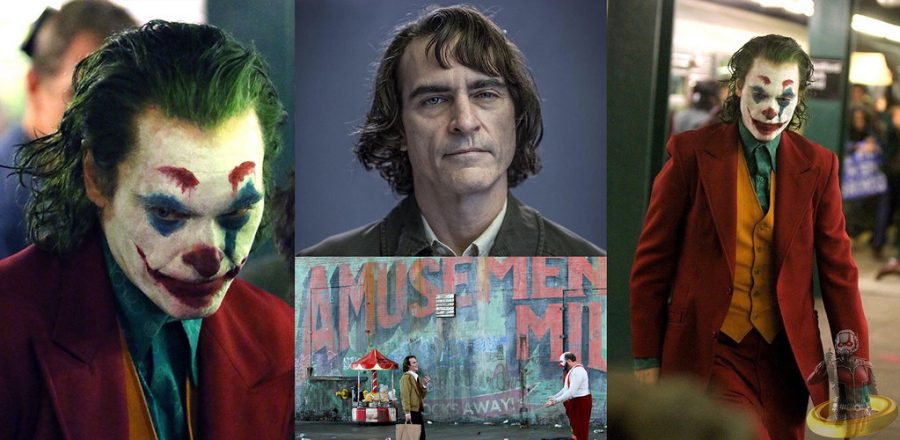The Clown Begins
When I first saw the a shortened trailer for “Joker,” I was confused. What more could be added to this character? Is it really artistically necessary to have an indie film about the famous DC villain, especially considering the controversy following it? The answer is: maybe. Spoilers ahead.
The film imagines the Joker as Arthur Fleck, a low income, mentally ill man living in Gotham during the 1980’s. His laugh doesn’t come from his job as an actual clown, but from a neurological condition that causes him to laugh no matter the situation.
Living in poverty means he lives in an apartment building where the elevator barely works, he relies on state funded psychiatric healthcare, and has to take public transit everywhere. He cares for his disabled mother, Penny Fleck, who is confined to their apartment. Despite all of this, Arthur dreams of being a comedian and being on “The Murray Show,” in which he positions the host Franklin Murray as a father figure.
What sets off the plot, or his transformation, is not just one event but a multitude of them. In the beginning of the film, a group of boys steal his ad and beat him up when he attempts to retrieve it. That gives him a strike at work. He later gets a gun from his fellow coworker claiming it’s for protection, but he drops it during an act at the local children’s hospital. Once his friend lies to his boss about how Arthur got said gun, it’s strike three.
Like Chekhov’s principle says, the gun goes off in Arthur’s hand, and his first murder victims are three rich businesses who harrassed a female passanger and attacked him on the subway. A few days later, his therapist tells him all the city has made budget cuts, meaning he will no longer see her and be able to afford his seven medications. Arthur finds out his three victims were employees of Wayne Enterprises and that leads to tensions between Gotham’s poor and rich.
Penny also worked for Thomas Wayne as well and it’s later revealed that Arthur is his son, making Bruce Wayne his half brother. However, the film implies Thomas forged an adoption between Penny and Arthur to hide any paternal link, using Penny’s mental illness and institutionalization to discredit any of her claims to the contrary. It’s also revealed both Penny and Arthur were abused by her ex-boyfriend, which lead to Arthur’s condition. That leads him to kill his mother in the hospital after a stroke from learning he is a suspect for the Wayne businessmen murders.
When he finally meets his imaginary father figure and gets to go on the show, Arthur admits to the murders and shoots Murray on live T.V. Chaos ensues, Martha and Thomas Wayne are killed by a clown protestor and Arthur is rescued from police custody, only to be institutionalized to Arkham Asylum. The rest is history.
Todd Phillps’ comments in Vanity Fair about comedy in “woke culture” made many think that this film was made to purely spite audiences by glorifying violence made by isolated white men. This explains many “no face masks” policy in theaters. The Avon Theatre, where I went, asked for no costumes whatsoever.
To be honest, I don’t find Phillps’ comments deep or true. However, what has me confused is the film doesn’t actually reflect this attitude.
In the one scene where Arthur murders Murray, Murrary does not kick him out nor call the police when Arthur admits to the businessmen murders. Instead, the show continues and Arthur is given the chance to explain and talk about his misanthropic rhetoric. Arthur even says “comedy is subjective” when asked why he finds horrible events so funny. When Murray finally gives the order to call the cops, it’s too late. Just strictly going by text, this scene showcases that giving a violent person a platform can lead to awful consequences.
There is also a commentary on the stigmatization of mental illness and how it relates to gender. Both Penny and Arthur are discarded by society, with Penny not getting any help from Thomas, and Arthur being off his medication due to lack of city funding. However, their fates are entirely different. Penny never feels as if she must seek revenge, but Arthur does. Between the two mentally ill people, it is the male one that rises to some kind of power, while the woman dies because of him.
I do have to ask, is it really ethical to put out a movie that can easily be interpreted as violence glorification? If the director really wanted to emphasize the message of “violence from isolated yet entitled people is not justified,” why is there concern over the film conveying the exact opposite? How much fault is the director at versus the audience?
Is this film about the danger and power of words? Maybe. Can this film lead others to feel as if the Joker is right? I’m not sure. Does this film leave me with more questions than answers? The answer is absolutely.

